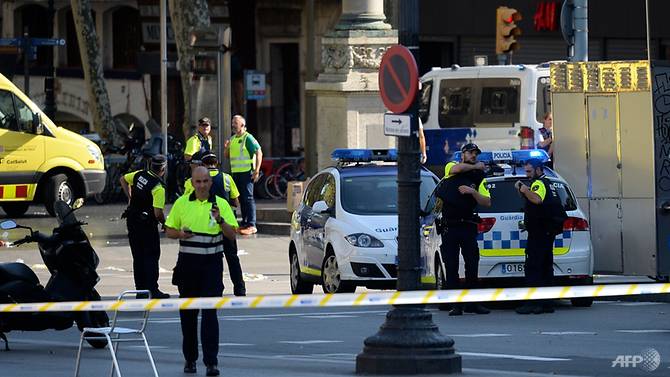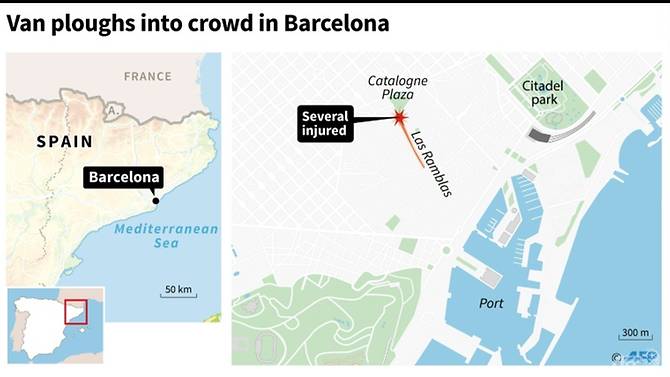13 dead in Barcelona van carnage, driver at large
 |
| Medical staff members and policemen stand in a cordoned off area after a van ploughed into the crowd, injuring several persons on the Rambla in Barcelona on August 17, 2017. (AFP Photo/Josep Lago) |
Police announced the arrest of two suspects, identified as a Spaniard and a Moroccan, but said the driver was still on the run.
Witnesses told of scenes of chaos and horror, with bodies strewn along the famous boulevard as other people fled for their lives, screaming in panic.
The rampage in a city hugely popular with tourists from around the world is the latest in a wave of attacks in Europe where vehicles have been used as weapons of terror.
As world leaders united in condemning the carnage, the IS propaganda agency Amaq claimed that it was carried out by "soldiers" from the militant group.
"We're united in grief," Spanish Prime Minister Mariano Rajoy said in a televised address after rushing to Catalonia where Barcelona is located - a region in Spain's northeast where a pro-independence movement has caused friction with the central government.
"Above all we're united in the firm intention to defeat those who want to take our values and way of life from us."
Regional interior minister Joaquim Forn said 13 people had died and another 100 were injured in what police were treating as a "terrorist attack", warning that the death toll could rise further.
There were at least 18 nationalities among the victims who came from countries as varied as France, Venezuela, Australia, Ireland, Peru, Algeria and China, according to Spain's civil protection agency.
Belgium said one of its citizens had died in the Las Ramblas assault, while The Hague said three Dutch were injured and a Greek diplomat reported three nationals had been wounded - a woman and her two children.
'WHOLE STREET STARTED TO RUN'
Las Ramblas is one of Barcelona's busiest streets, lined with shops and restaurants and normally packed with tourists and street performers until well into the night.
 |
| The deadly van attack took place on Las Ramblas, Barcelona's most famous street. (AFP/Iris ROYER DE VERICOURT) |
"When it happened I ran out and saw the damage," local shop worker Xavi Perez told AFP. "There were bodies on the ground with people crowding round them. People were crying. There were lots of foreigners."
Witness Aamer Anwar told Britain's Sky News television that he was walking down Las Ramblas, which he described as "jam-packed" with tourists. "All of a sudden, I just sort of heard a crashing noise and the whole street just started to run, screaming. I saw a woman right next to me screaming for her kids."
Footage broadcast on Spanish television showed a white van, its front completely crushed, abandoned by its driver on a road surrounded by police cars.
Tom Gueller, who lives on a road next to Las Ramblas said he saw the vehicle speeding along the boulevard.
"It wasn't slowing down at all. It was just going straight through the middle of the crowds in the middle of the Ramblas," he told BBC radio.
Ethan Spibey, a charity director on holiday, said he and several others locked themselves in a nearby church. "All of a sudden it was real kind of chaos ... people just started running screaming," he told Sky. "There was kind of a mini stampede."
EUROPE'S DEADLIEST ATTACK
Spain had until now been spared the kind of extremist violence that has rocked nearby France, Belgium and Germany.
But it was hit by what is still Europe's deadliest militant attack in March 2004, when bombs exploded on commuter trains in Madrid, killing 191 people in an attack claimed by Al Qaeda-inspired extremists.
Tom Gueller, who lives on a road next to Las Ramblas said he saw the van speeding along the boulevard. "It wasn't slowing down at all. It was just going straight through the middle of the crowds in the middle of the Ramblas," he told BBC Radio.
Police said on Thursday that one of the arrested suspects was a Spaniard born in Melilla, a Spanish territory on Morocco's north coast, and the other a Moroccan named as Driss Oukabir.
The Spaniard was arrested in Alcanar, about 200 kilometres south of Barcelona, the scene of an explosion in a house late Wednesday that left one person dead and is believed to be linked to Thursday's assault.
"We suspect that they (the occupants) were preparing an explosive device," Josep Lluis Trapero of the regional Catalonia police told reporters.
In another incident on Thursday, police shot at a vehicle that forced its way through a roadblock in Barcelona after the van attack, knocking down two officers.
Belgium said one of its citizens had died in the Las Ramblas assault, while The Hague said three Dutch were injured and a Greek diplomat three nationals had been wounded - a woman and her two children.
Thursday's attack drew condemnation from across the globe.
Spain's royal family vowed that their country would not be "terrorised" by extremists.
'REVOLTING ATTACK'
US President Donald Trump condemned the "terror attack" and said the United States will do whatever is necessary to help", adding: "Be tough & strong, we love you!"
France's President Emmanuel Macron - whose country has witnessed a series of bloody militant atrocities including a truck rampage in Nice in July 2016 that killed 86 people - said his thoughts were with the victims of the "tragic attack".
A spokesman for German Chancellor Angela Merkel condemned the "revolting attack" and British Prime Minister Theresa May said on Twitter that London "stands with Spain against terror".
The Nice carnage and other assaults including the 2015 shootings and bombings on Paris nightspots were claimed by the Islamic State, but it is believed to be the first IS claim of an attack in Spain.
Spain has emerged as a potential target for jihadists, with extremist websites mentioning it for historical reasons, since much of its territory was once under Muslim rule.
Catalonia has the highest concentration of radicalised Islamists in the country along with Madrid and the Spanish territories of Ceuta and Melilla in northern Morocco.
According to the interior ministry, more than 180 "jihadist terrorists" have been arrested since 2015, most of them for propaganda, recruitment for extremist groups or "glorifying terrorism."
On Thursday, the Radicalisation Awareness Network, created by the European Commission, warned that between 1,200 and 3,000 Europeans who lived with and fought for IS in Iraq and Syria could return home.
What the stars mean:
★ Poor ★ ★ Promising ★★★ Good ★★★★ Very good ★★★★★ Exceptional
Latest News
More News
- Russian President congratulates Vietnamese Party leader during phone talks (January 25, 2026 | 09:58)
- Worldwide congratulations underscore confidence in Vietnam’s 14th Party Congress (January 23, 2026 | 09:02)
- Political parties, organisations, int’l friends send congratulations to 14th National Party Congress (January 22, 2026 | 09:33)
- 14th National Party Congress: Japanese media highlight Vietnam’s growth targets (January 21, 2026 | 09:46)
- 14th National Party Congress: Driving force for Vietnam to continue renewal, innovation, breakthroughs (January 21, 2026 | 09:42)
- Vietnam remains spiritual support for progressive forces: Colombian party leader (January 21, 2026 | 08:00)
- Int'l media provides large coverage of 14th National Party Congress's first working day (January 20, 2026 | 09:09)
- Vietnamese firms win top honours at ASEAN Digital Awards (January 16, 2026 | 16:45)
- ASEAN Digital Ministers' Meeting opens in Hanoi (January 15, 2026 | 15:33)
- ASEAN economies move up the global chip value chain (December 09, 2025 | 13:32)
















 Mobile Version
Mobile Version